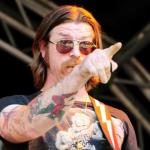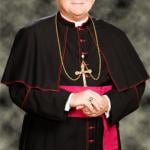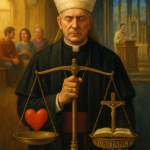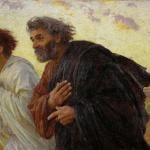From Vatican Radio:
The Vatican’s Congregation for Institutes of Consecrated Life and Societies of Apostolic Life on Monday released a new document focused on the role and vocation of religious brothers in the life of the Church. The document, entitled ‘Identity and Mission of the Religious Brother in the Church’, was presented at a press conference by the head of the Congregation, Cardinal João Braz de Aviz, and its secretary, Archbishop José Rodríguez Carballo.
Lay religious men, or brothers as they’re commonly called, make up about a fifth of all male religious in the Catholic Church today. They are men who are not ordained to the priesthood but are normally consecrated to a life of service within the different orders, societies or congregations.
In his presentation Archbishop Carballo noted that the origin of this figure in the Church dates back to the centuries following Emperor Constantine’s Edict of Milan recognizing Christianity as an official religion. From this point on, he said, people began using the faith for their own interests, losing the fervor of the first Christian communities who often lived in fear of their lives. From that time on, men seeking to maintain an authentic witness to Christ’s teachings consecrated themselves to a life of solitude, or later, to a life of community service.
NCR notes:
In its section on the mystery of the gift received by brothers, the document says that by their consecration religious brothers express “that the mystery of Christ the Savior is being fulfilled here today, in this world and through the Church today.”
“Therefore consecrated people should frequently ask themselves how to be witnesses of the Lord today,” it recommends. “What kind of presence should we live so that the Lord Jesus can be seen, experienced, by people today?”
The document also speaks movingly of the brothers’ mission in the church, using evocative imagery from both the Gospels and the Old Testament, such as: Jesus’ sharing of bread, his wearing a towel to wash the feet of the apostles, the Good Shepherd who seeks the lost sheep, the Good Samaritan who helps the person in need, and Moses declaring the “covenant of the people.”
The brother’s mission, it states, “is not ‘what he does’ but rather his very life itself made communion with the least.”
“More than in external works, the mission consists in making Christ present to the world through personal witness,” it continues, saying that ministries “may vary or even disappear because of illness or old age, but the mission always remains.”
“It is, therefore, not a question of task but of identity,” states the document. “The minister is the whole person of the Brother: consecrated, member of a community, identified with the mission. All of him assumes the privilege and responsibility of representing the Church to the Good Shepherd who gives his life for the sheep.”
I haven’t been able to find a full text in English online, but if you find it, let me know!
Photo: Vatican Radio












